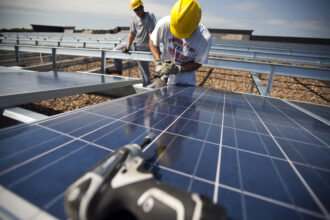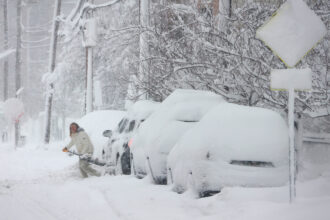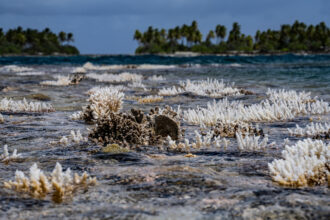House Puts Climate Bill on Fast Pace For Passage (Reuters)
Democratic leaders in the U.S. House have put major environmental legislation on a fast-track, boosting chances a climate change bill will pass this month or next, leading lawmakers say.
Green Energy Overtakes Fossil Fuel Investment (Business Green)
Four out of every 10 GW of new energy capacity built last year came from the renewables sector, and global investments in renewable energy overtook carbon-based fuels for the first time, attracting a record $155 billion, the UN reports.
FAO: Farm Aid Could Cut Climate Change, Poverty (AFP)
Aid to farmers in poor countries could help curb greenhouse gas emissions affecting climate change and reduce poverty and hunger for some billion people worldwide, the UN food agency says.
US Role in New Climate Treaty Hinges on China (Wonk Room)
Chief U.S. climate negotiator Todd Stern, headed to China for talks, says developing countries must commit to measurable change. “Certainly no deal will be possible if we don’t find a way forward with China.”
Business and Human Rights: Shell on Trial (Ethical Corp)
As Shell finally stands trial for its alleged complicity in the death of Nigerian activist Ken Saro-Wiwa, the case could have significant implications for international corporate liability.
Forest Carbon Market Already Shows Cracks (Reuters)
It could save rainforests, slow climate change, and the international community backs it. But a plan to pay tropical countries not to chop down trees risks being discredited by opportunists.
Brazil Approves Amazon Hydro Dam (Reuters)
Brazil approved a permit for a hydroelectric dam in the Amazon that the government hopes will shore up power supplies and critics are calling an ecological disaster.
Shale Drillers Push Back Against More Oversight (Houston Chronicle)
The oil and gas industry’s trade group says increased federal regulation of oil shale rock gas production could increase costs and chill production. A House committee is considering EPA oversight under the Safe Drinking Water Act.
Companies Show Little Awareness of Climate Change Risks (GreenBiz)
Two new studies from investor group Ceres, EDF and the Center for Energy and Environmental Security detail how slowly some of the world’s largest companies are in forming plans to mitigate the impacts of climate change on business operations.
Calculating the Cost of Carbon (Forbes)
U.S. firms produce $60 billion to $80 billion worth of carbon annually but don’t pay for it. A look at what the carbon market could mean for investor opportunity.
Age of scarcity: Shortages Yield Investment Opportunities (Financial Times)
Environmental problems are combining with global population growth to create shortages in food, energy and water – our most fundamental commodities.
Can Lasers Save the Incandescent Lightbulb? (CNet)
Optics researchers at the University of Rochester find ultra-fast lasers can change the properties of the tungsten filament so it would shine more brightly while still using the same amount of electricity.
Former GOP Sen. George Allen Shills for Dirty Energy (Grist)
Remember George Allen, the former GOP senator from Virginia best known for using the slur “macaca” on camera during a failed election bid? Apparently, he’s making his comeback as the anti-climate bill poster boy, flacking for coal and oil.
Coal: Now West Virginia’s Official State Rock (Coal Tattoo)
That’s right — West Virginia’s top Friend of Coal, Gov. Joe Manchin, has signed a legislative resolution that declares coal to be the state’s official rock.
About This Story
Perhaps you noticed: This story, like all the news we publish, is free to read. That’s because Inside Climate News is a 501c3 nonprofit organization. We do not charge a subscription fee, lock our news behind a paywall, or clutter our website with ads. We make our news on climate and the environment freely available to you and anyone who wants it.
That’s not all. We also share our news for free with scores of other media organizations around the country. Many of them can’t afford to do environmental journalism of their own. We’ve built bureaus from coast to coast to report local stories, collaborate with local newsrooms and co-publish articles so that this vital work is shared as widely as possible.
Two of us launched ICN in 2007. Six years later we earned a Pulitzer Prize for National Reporting, and now we run the oldest and largest dedicated climate newsroom in the nation. We tell the story in all its complexity. We hold polluters accountable. We expose environmental injustice. We debunk misinformation. We scrutinize solutions and inspire action.
Donations from readers like you fund every aspect of what we do. If you don’t already, will you support our ongoing work, our reporting on the biggest crisis facing our planet, and help us reach even more readers in more places?
Please take a moment to make a tax-deductible donation. Every one of them makes a difference.
Thank you,











